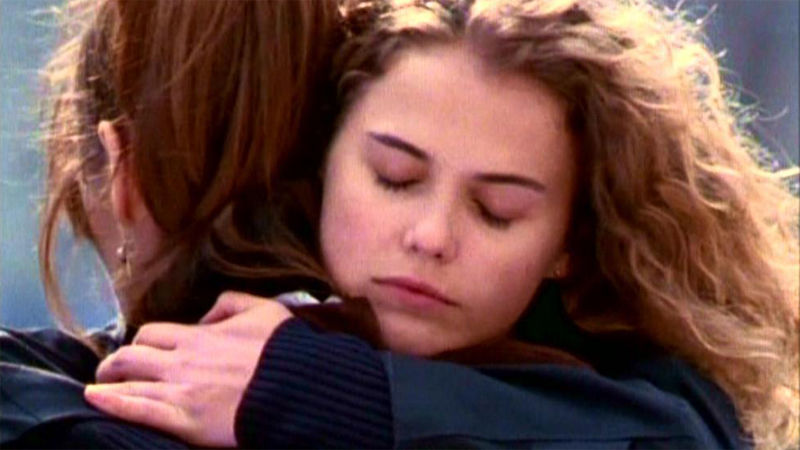There are some signs that he’s a little weird, though. He reacts poorly when she critiques his film—even though he asks her to!—but eventually realizes his mistake and addresses it (he doesn’t actually ever apologize, though, which I almost missed). He’s a tad dramatic when she’s apprehensive about their first kiss and he responds by asking for a noose. And he gets a little momentarily aggressive in a subsequent make out sesh. But he’s also awesome. It turns out the reason Julie gets “really freaked out” when Zach kisses her is because, she tells him later, “You treat me like an actual person,” which is something she’s obviously not used to from a suitor. Felicity even tells Julie that she’s jealous of her and Zach’s “whole situation.”
When, just a few scenes later, we watch Julie and Zach giggle their way back to her dorm room after recording music and going out—Zach has a token beer in his hand, of course!—we don’t know what’s in store. They kiss into her room, and he shuts the door behind them, ending the scene.
Next, we see Julie in her room folding laundry and looking despondent; she eventually tells Felicity, and then a doctor at the hospital, what happened that night with Zach. This includes that their hooking up started out as consensual and switched in the middle. Though Julie’s unsure if what happened was rape as she didn’t “scream” or “hit him,” and “he wasn’t violent,” her doctor confirms that indeed it was.
What’s so incredible about the story line is that there’s a lot of nuance and ambiguity in these relationships and interactions. Julie and Zach liked and even respected each other; they had a good thing going; they made out for half an hour before she said she didn’t want to have sex—but it was still rape! Because that’s the thing—rape, and especially non-stranger rape (the most common kind)—is rarely black and white; and you don’t have to be an entirely bad guy to commit it. Admittedly, this is a somewhat difficult concept to follow, let alone get right on a television show, but the fact that Felicity goes for it and nails it, and all the way back in 1998, no less, is nothing short of revolutionary.
And it’s not just the nuances of the relationship that Felicity pegs; it’s the logistics too. Felicity and Noel (her RA and sometimes love interest) seek out a school counselor to find out what Julie’s options are, and the counselor very thoroughly spells out all the avenues she can take. Buoyed along by her friends’ encouragement, Julie eventually meets with the school counselor herself, and it’s implied that it’s in this meeting that Julie reports Zach, as the next time we see him he’s being pulled out of class.
While it takes Zach a while to grasp the magnitude of everything—he goes from clueless to defensive, at first—he eventually does, and the last conversation he and Julie have is surprisingly endearing. Julie, anxious that Zach doesn’t know what he’s in for, goes to tell him she’s fighting this, only to find him packing to leave school.
As they talk, he isn’t defensive; he admits that what happened was in fact rape even though he “didn’t attack [her]; [he] didn’t rip [her] clothes off,” mirroring back Julie's fears from earlier in the episode. He hands her a note he was going to leave her. “It says all the obvious stuff—how sorry I am, how horrible that night must have been for you, how I wish things would have happened very differently.” He tells her it wasn’t her fault; he actually apologizes this time, using the words “I’m sorry” and everything. Julie says she’s sorry too; because she is. Not because she did anything wrong, but because she wishes it had gone down differently too.
In the end, Julie didn’t have to wait for a school court to decide her fate like Emma Sulkowicz and so many others, and she never had to testify. Whatever the dean of the university said to Zach in their meeting must have been pretty hardcore because he admitted to the dean—and then to his parents—that he was guilty.


